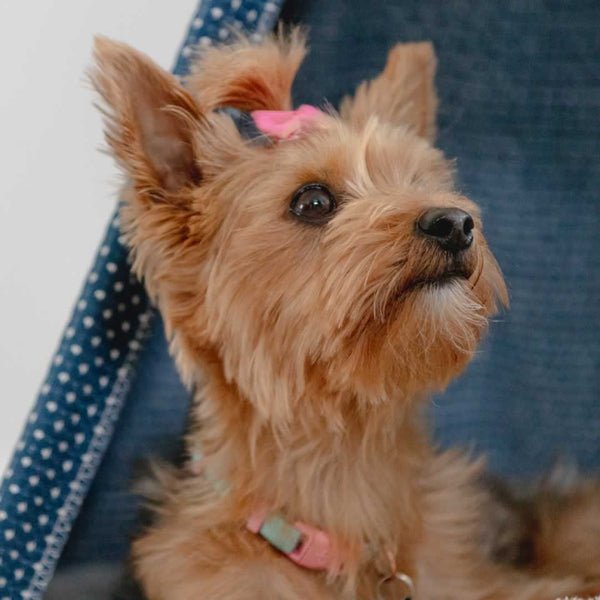Your Cart is Empty

What to Know Before Buying or Adopting a Puppy
by Pickle J. Sniffington August 16, 2022 4 min read
At Pickle & Polly, we know that feeling. When you see a family in the park having fun with their dog, or a video of an adorable puppy while scrolling, you think to yourself, "should I get a dog?" Dogs are great companions, but that doesn't mean everyone can commit to dog ownership. This article will go over what you should know before bringing home a new furry friend, and how to look after your new puppy if you do.
Consider the Cost of Dog Ownership
You won't be sending your furry child off to college, and they will likely eat much less than your human offspring - however, dogs aren't cheap and will require a continued financial commitment to keep them healthy and safe. Also, keep in mind that larger breeds will cost more than smaller dog breeds.
Ensure you have a good idea of what dog ownership will cost you before fully committing. After your initial purchase costs, you will want to give your new pet high-quality food, toys, collars, regular visits to the vet, and you may need to budget for professional dog training lessons. You will also have to consider grooming costs if you aren't going to do it yourself.
Will a Dog Fit Your Lifestyle?
Your lifestyle will play a significant role in whether you can bring a new puppy into your family. Dogs are social creatures and don't do well spending long hours by themselves because they need regular interaction, exercise, and play.
If your idea of a great weekend is to spend most of your time relaxing on the couch, a dog isn't out of the question, you just need to choose a compatible breed. For example, a working breed with lots of energy to burn is not a suitable choice.
Essential Dog Training
Untrained dogs can be challenging to live with, but creating a polite dog requires training. You can do it yourself, but professional training classes will get you better results faster if you don't have dog training experience. At a minimum, your dog should be potty trained and know some manners such as when to sit, stay, speak, or remain quiet.
Do You Have Time for a Dog?
How much time you have for your pet is related to your lifestyle. Busy professionals who regularly get called away on the weekends should carefully consider whether adopting a puppy is in your, and its, best interest.
If you know you won't be home for long stretches, you could arrange to have someone else care for your animal. Otherwise, an aquarium might be more your style.
Even when you are home, your pet will need some of your time for walking and interactive play each day, so before adopting a puppy, make sure you can be available for them.

Is Your Home Dog Compatible?
Some dog breeds are more active than others and will need more room to play when you aren't home. A fully fenced, large backyard is essential for large, intelligent breeds, but don't forget that many smaller breeds are pint-sized bundles of energy that will be miserable if they are cramped up inside all day, too. Of course, there are breeds of all sizes that will be content to curl up under your feet all day, provided they get their daily exercise.
Matching the right breed with your home is critical, so take your time deciding. Get it wrong, and the both of you may end up being terrible company for each other.
Caring for Your New Puppy
Now that you know the impact a dog will have on your life, but are still convinced dog ownership is for you, here's how to raise a puppy so it grows into a confident, well-behaved dog.
Developing a Puppy's Social Skills
What a puppy experiences in its first three months will affect it for life, so make sure to give your new puppy as many positive experiences as possible! Take them on walks where they will see lots of different people. The more variety, the less likely they will have an adverse reaction when encountering an unfamiliar situation as an adult.
Your puppy should be free to approach strangers on their terms rather than have the new person force themselves upon them. This way, your puppy will be much more comfortable with the encounter and won't develop negative associations. It will also help if your visitor rewards the puppy with a treat and enthusiastic praise.
Teaching a Puppy How to Be Alone
Raising a puppy with good social graces gives them vital life skills, but so too is knowing how to be alone. It can be hard to give a puppy a timeout, especially when children are in the household. Puppies can barely get a moment to themselves, but they do need to learn how to behave when no one else is around.
You should ensure they can keep themselves occupied when human companions are unavailable. A chewing toy is ideal for building positive associations with alone time. Keep the intervals short at first, and gradually increase your time away until your puppy is confident with its own company.
Restraint and Leash Training
Early leash training will make walking a fully grown animal a pleasure, but restraint training will also help with grooming and vet visits. Gentle pats followed by a treat will develop positive associations with handling.
As you progress with your training, you should be getting more invasive with handling until your puppy is comfortable with you poking around inside their mouth or performing a close inspection of their ears.

Don't Push a Puppy Too Hard
Puppies can be fast learners, but you should avoid pushing them out of their comfort zone. Let your puppy decide the pace of their training; otherwise, you risk creating a negative association that will last a lifetime. Be patient, and with lots of encouragement, praise, and delicious treats, your new puppy will soon be a well-behaved member of the household and able to face the world confidently.
Join Our Furry Pals Program!
Subscribe to our newsletter for the latest news, access to new products, and exclusive discounts!

Join Our Furry Pals
Sign up to get the latest news on sales, new products, and more!

